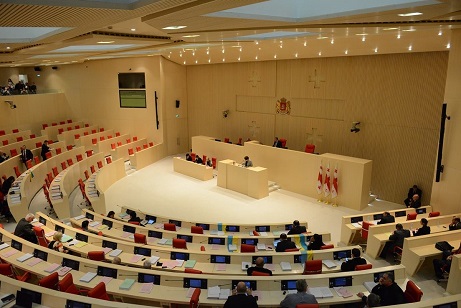Venice Commission says Georgia’s law on e-communications puts media freedom, right to property, fair trial at risk

The Venice Commission invites the legislator to carry out a ‘full and thorough re-examination' of the amendments. Photo: Nino Alavidze/Agenda.ge
The Council of Europe’s Venice Commission says the amendments to the Georgian Law on Electronic Communication ‘leads to far reaching consequences for the right of property and media freedom as well as for the right to a fair trial’.
The Georgian National Communications Commission (GNCC) which is the regulatory body overseeing broadcasting and electronic communications in Georgia is authorised to appoint special managers to companies after the parliament endorsed amendments to Law on Electronic Communications last July.
In its opinion adopted on March 20 the Venice Commission says the new Article 46 No. 1 ‘significantly altered’ regulatory power, empowering the GNCC to appoint a special manager to remedy unlawful acts conducted by operators in alleged violations of competition law, while the new Article 11 stipulates immediate enforceability of legal acts by the GNCC including decisions under Article 46 No. 1.
The Venice Commission acknowledges the aim of the legislator not to endanger access to the internet for end users and thus not wishing to revoke an operating licence in cases of alleged infringements of domestic law. Nevertheless, the current solution chosen by the legislator in Art. 46 No. 1 and Art. 11 of the Law on Electronic Communications leads to far reaching consequences for the right of property and media freedom as well as for the right to a fair trial”, the document reads.
It further notes that the Venice Commission is ‘unaware’ of the ‘extraordinary powers ’that the special manager appointed by the GNCC enjoys, which resembles 'a court-appointed administrator' in a bank or financial institution or a court-appointed liquidator in relation to a company in distress.
The document says Article 46 No. 1 is ‘overly broad and vague’ giving the GNCC the power to equip the special manger to take all managerial decisions from top to bottom without being subject to previous checks and balances as prescribed by corporate law, such as board of directors' control.
The powers are ‘so vast and over-reaching’ that the only limitation seems to be the alienation of the shareholding, leaving the shareholders with no say in the decision-making structures or processes within the company.
Moreover, the Venice Commission notes that, 'albeit not intended by the legislator, the new Art. 46 No. 1 puts media freedom at risk of state interference and therefore necessitates explicit safeguards prescribed by law'.
The provision in its current version creates a spill over effect on broadcasting and has the strong potential to cause a chilling effect on the editorial independence of the broadcasting side of electronic communications operations. It is therefore necessary to amend the new Art. 46 No. 1 in such a manner as to clearly stipulate that the provision in no manner applies to the broadcasting operations of the electronic communications operator", the document reads.
Because of ‘these and other critiques’, the Venice Commission invites the legislator to carry out a ‘full and thorough re-examination of the two amendments’ taking into consideration its recommendations.
 Tweet
Tweet  Share
Share


/business-disputes.jpg)



